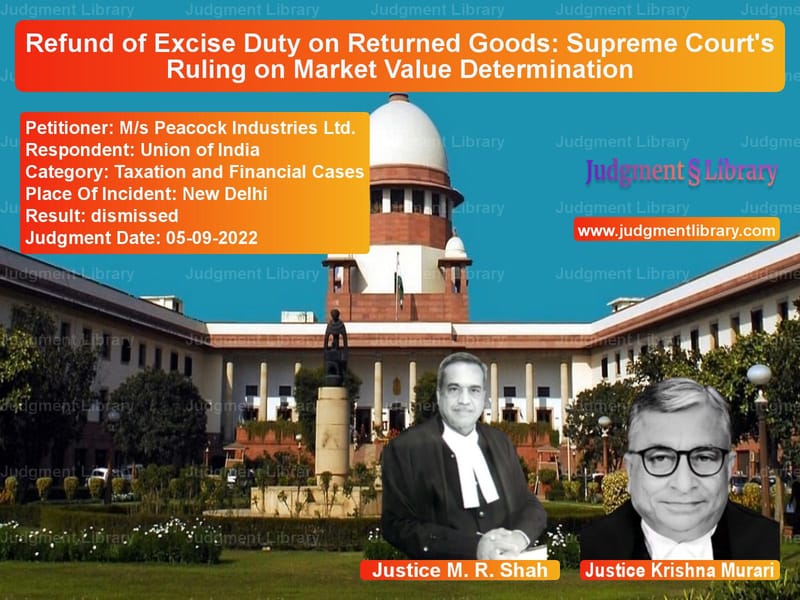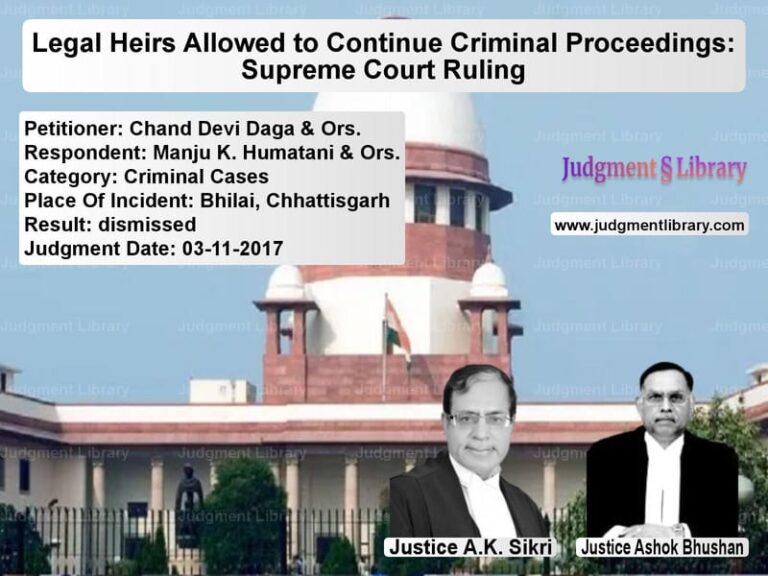Refund of Excise Duty on Returned Goods: Supreme Court’s Ruling on Market Value Determination
The Supreme Court of India recently delivered an important judgment in the case of M/s Peacock Industries Ltd. v. Union of India, which dealt with the issue of refund of excise duty on goods returned by a dealer. The appellant, Peacock Industries Ltd., had submitted a claim for a refund of excise duty on returned goods, specifically plastic-moulded furniture. However, the Department had denied the refund based on the value of the returned goods being less than the original excise duty paid on them. The key issue in this case was the determination of the value of returned goods for the purpose of calculating the excise duty refund.
The appellant contended that they should be entitled to a refund under Section 173-L of the Central Excise Act, 1944, for the excise duty paid on goods returned by the distributor. The appellant argued that the value of the returned goods should be calculated based on their market value as second-hand goods or as raw materials, but the Assessing Officer valued the goods as scrap, leading to the rejection of the refund claim.
Background of the Dispute
The appellant, M/s Peacock Industries Ltd., is a manufacturer of plastic-moulded furniture. The company had issued credit notes to distributors for the return of goods, which included plastic furniture that was unsold or rejected by the distributors. These goods were returned to the company after the payment of excise duty. The appellant filed a refund claim with the Department based on the return of goods, arguing that the excise duty paid at the time of clearance should be refunded in accordance with Section 173-L of the Central Excise Act, 1944.
However, the Deputy Commissioner rejected the refund claim, valuing the returned goods as scrap at Rs. 8 to 10 per kg, based on a market survey report. The appellant had not provided evidence of the market value of the returned goods, nor had they raised the issue of not receiving a copy of the market survey report during the proceedings. The Tribunal upheld the rejection, and the matter was then referred to the High Court for adjudication.
Petitioner’s Arguments
The petitioner, M/s Peacock Industries, presented several arguments before the Supreme Court. First, the petitioner argued that the excise duty refund should be granted based on the value of the returned goods, which could either be their market value as second-hand goods or, in the alternative, their value as raw materials. The petitioner contended that the Department had wrongfully valued the returned goods as scrap, without considering their potential reuse value in manufacturing.
The petitioner’s counsel argued that the value of the returned goods, as second-hand or raw materials, should be the determining factor for calculating the refund, as this would reflect their actual worth. The petitioner also pointed out that the Department had failed to provide sufficient evidence on the market value of the returned goods, and the market survey report was not supplied to the appellant, which violated principles of natural justice. The petitioner requested the Court to order the refund of excise duties based on the correct value of the goods.
Respondent’s Arguments
The respondent, Union of India, represented by the learned ASG, argued that the rejection of the refund claim was in accordance with the provisions of the Central Excise Act. The respondent pointed out that the market survey report was conducted by the Department and indicated that the returned goods were to be treated as scrap, with a value of Rs. 8 to 10 per kg. The respondent emphasized that the appellant failed to provide any cogent evidence on the actual market value of the returned goods.
Read also: https://judgmentlibrary.com/income-tax-deduction-on-bad-debts-supreme-court-ruling-explained/
The respondent further argued that Section 173-L of the Central Excise Act, which allows for the refund of excise duty on returned goods, specifically requires the value of the returned goods to be determined at the time of their return to the factory. The respondent’s counsel highlighted that since the value of the returned goods was less than the duty paid at the time of their clearance, the refund claim was correctly denied.
Court’s Reasoning
The Supreme Court carefully analyzed the provisions of Section 173-L of the Central Excise Act, which deals with the refund of excise duty on goods returned to the factory. The Court noted that the refund of excise duty is permissible when excisable goods are returned to the factory for re-manufacturing, refining, reconditioning, or similar processes. The Court emphasized that the value of the returned goods must be determined at the time of their return, and not based on the excise duty paid at the time of clearance from the factory.
The Court referred to the explanation under Section 173-L, which defines the “value” of the returned goods as the market value, not the ex-duty value. The Court noted that the appellant had failed to provide cogent evidence regarding the market value of the returned goods. The Court pointed out that the appellant had not raised the issue of the market survey report not being provided to them during the earlier proceedings, nor did they challenge the findings based on the report.
Judgment
The Supreme Court dismissed the appeal filed by M/s Peacock Industries Ltd. The Court upheld the decision of the Department and the findings of the Tribunal and the High Court. The Court ruled that the appellant was not entitled to a refund of excise duty on the returned goods, as the value of the goods determined by the Deputy Commissioner was less than the duty originally paid at the time of clearance. The Court also held that the valuation of the returned goods as scrap at Rs. 8 to 10 per kg was reasonable, as the appellant had failed to provide evidence to establish a higher market value.
Conclusion
This case reinforces the importance of providing adequate evidence when making a refund claim under the Central Excise Act. The judgment highlights that the value of returned goods for the purpose of excise duty refund must be determined based on their actual market value at the time of return, and not based on the ex-duty value or speculative value as raw materials. The decision also underscores the need for parties to provide cogent evidence to support their claims, and the Court’s reliance on market survey reports in determining the value of goods.
Petitioner Name: M/s Peacock Industries Ltd..Respondent Name: Union of India.Judgment By: Justice M. R. Shah, Justice Krishna Murari.Place Of Incident: New Delhi.Judgment Date: 05-09-2022.
Don’t miss out on the full details! Download the complete judgment in PDF format below and gain valuable insights instantly!
Download Judgment: ms-peacock-industri-vs-union-of-india-supreme-court-of-india-judgment-dated-05-09-2022.pdf
Directly Download Judgment: Directly download this Judgment
See all petitions in Income Tax Disputes
See all petitions in Customs and Excise
See all petitions in Tax Evasion Cases
See all petitions in Banking Regulations
See all petitions in Tax Refund Disputes
See all petitions in Judgment by Mukeshkumar Rasikbhai Shah
See all petitions in Judgment by Krishna Murari
See all petitions in dismissed
See all petitions in supreme court of India judgments September 2022
See all petitions in 2022 judgments
See all posts in Taxation and Financial Cases Category
See all allowed petitions in Taxation and Financial Cases Category
See all Dismissed petitions in Taxation and Financial Cases Category
See all partially allowed petitions in Taxation and Financial Cases Category







